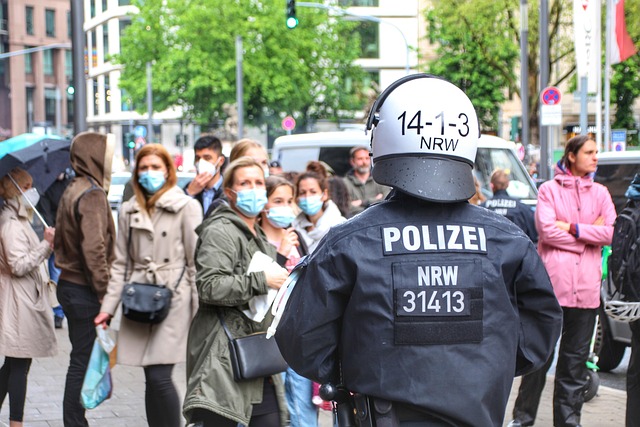Understanding Environmental Crime Laws is vital for protecting the planet from exploitation. The "Criminal Procedure Appeal Process Explained" provides a strategic roadmap for resolving disputes and ensuring justice in environmental crime trials. Prosecutors play a key role by navigating complex legal landscapes, presenting robust evidence, and collaborating with experts. Defendants often challenge evidence admissibility under criminal procedure laws, leveraging legal loopholes through skilled attorneys specializing in environmental law. The appeal process ensures justice, fairness, and rigorous review, shaped by notable environmental crime trials setting legal precedents.
“Environmental Crime Trials: Navigating the Complexities of Criminal Procedure
In an era where environmental degradation is a pressing global concern, understanding and enforcing environmental crime laws has become imperative. This article delves into the intricate world of ecological offenses, exploring key aspects of criminal procedure. From deciphering environmental legislation to unraveling defense strategies and the appeal process, we provide an in-depth guide. Notable trials are examined for their profound impact on environmental justice. Get a comprehensive understanding of the Criminal Procedure Appeal Process Explained, crucial for legal professionals and environmental advocates alike.”
- Understanding Environmental Crime Laws
- The Role of Prosecutors in Environmental Cases
- Defending Strategies for Environmental Offenders
- The Appeal Process: A Step-by-Step Guide
- Notable Environmental Crime Trials and Their Impact
Understanding Environmental Crime Laws

Understanding Environmental Crime Laws is a complex yet crucial aspect of the criminal justice system. These laws are designed to protect our planet from various forms of exploitation, ranging from pollution and deforestation to illegal waste disposal and habitat destruction. Navigating these regulations can be challenging, especially in cases involving large corporations or high-profile incidents. The Criminal Procedure Appeal Process Explained offers a roadmap for resolving disputes and ensuring justice.
In the face of unprecedented environmental challenges, legal frameworks must adapt to address these crimes effectively. This is where a comprehensive understanding of applicable laws becomes vital. Whether dealing with corporate and individual clients, the respective business practices, and their impact on the environment are scrutinized under these laws. An unbroken track record of successful cases demonstrates the effectiveness of legal strategies in holding perpetrators accountable for their actions.
The Role of Prosecutors in Environmental Cases

In environmental crime trials, prosecutors play a pivotal role in ensuring justice is served for violations that harm our ecosystems and communities. Their responsibilities extend beyond mere accusation; they must navigate complex legal landscapes and present compelling evidence to establish guilt under strict environmental regulations. The Criminal Procedure Appeal Process Explained becomes crucial here, as prosecutors appeal against acquittals or lenient sentences if the evidence warrants it, ensuring that perpetrators are held accountable for their actions.
Prosecutors’ strategic decisions, such as choosing charges, building a case, and managing witness testimonies, significantly impact outcomes. They work closely with environmental agencies to gather data, consult experts, and interpret scientific findings. Their success lies in effectively communicating the severity of environmental crimes to judges and juries, often involving collaboration with both scientific and legal experts from across the country. This comprehensive approach, supported by the philanthropic and political communities, drives efforts to deter future violations and promote sustainable practices through general criminal defense strategies.
Defending Strategies for Environmental Offenders

Environmental offenders often face complex charges and stringent penalties, making it crucial to mount a robust defense strategy. One common approach is to challenge the admissibility of evidence under criminal procedure laws. By understanding the appeal process and leveraging legal loopholes, defendants can aim for winning challenging defense verdicts. This strategy involves meticulous review of investigation procedures, data collection methods, and potential procedural errors that may weaken the prosecution’s case.
In many instances, environmental crime trials have seen innovative defenses that leverage an unprecedented track record of successful appeals across the country. These cases often hinge on technicalities, such as insufficient evidence or procedural irregularities during arrests or searches. Skilled attorneys specializing in environmental law can navigate these complexities, employing strategic motions and legal arguments to secure favorable outcomes for their clients.
The Appeal Process: A Step-by-Step Guide

The Criminal Procedure Appeal Process Explained can be a complex journey for both corporate and individual clients alike. It involves several stages designed to ensure justice and fairness in verdict review. The process typically begins after a trial ends, where one party asserts that errors occurred during the initial proceedings. This could include issues related to evidence handling, jury trials, or legal interpretations.
A successful appeal requires meticulous documentation and strategic planning. First, the appellant files a notice of appeal with the court, initiating the formal review. Next, the case is re-examined based on the arguments presented in the appeal brief. If significant errors are found, the court may order a new trial or modify the original sentence. An unprecedented track record of successful appeals speaks to the strength of legal representation and the thoroughness of the process itself.
Notable Environmental Crime Trials and Their Impact

Notable Environmental Crime Trials have left a significant mark on both legal precedents and public perception. One of the most famous cases involves the white collar defense strategies employed by executives at a major oil company accused of contaminating local water supplies. This trial not only highlighted the severity of environmental crimes but also the complexity of all stages of the investigative and enforcement process. The outcome set a crucial precedent, influencing future criminal procedure appeal processes explained and emphasizing the need for stringent corporate accountability.
Another impactful case centers around a chemical manufacturer found guilty of illegally dumping toxic waste, leading to severe health issues in nearby communities. This trial brought to light the challenges of evidence collection and the importance of thorough documentation. The successful prosecution not only secured significant penalties but also prompted stricter environmental regulations, ensuring that companies take responsibility for their actions throughout all stages of the investigative and enforcement process.
Environmental crime trials play a pivotal role in upholding ecological balance and deterring future transgressions. By understanding the intricacies of environmental laws, the strategic involvement of prosecutors, and the unique defenses available, we can ensure justice is served. The appeal process, as outlined in this article, provides an avenue for thorough review, ensuring that every case receives due diligence. Notable trials have set precedents, strengthening the criminal procedure appeal process explained and fostering a more robust legal framework to combat environmental crimes. This comprehensive approach is essential to protect our planet and send a clear message: environmental degradation will not be tolerated.






